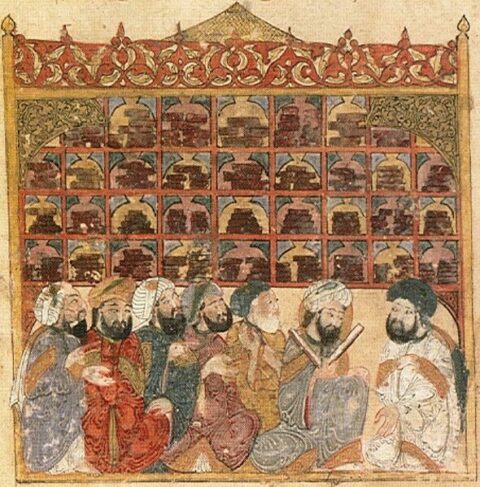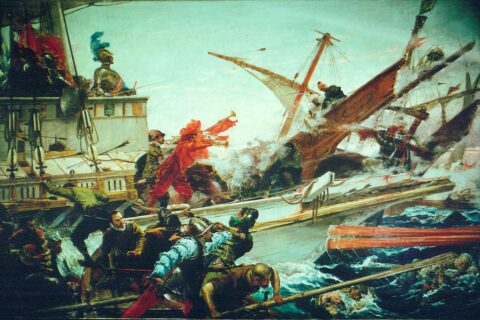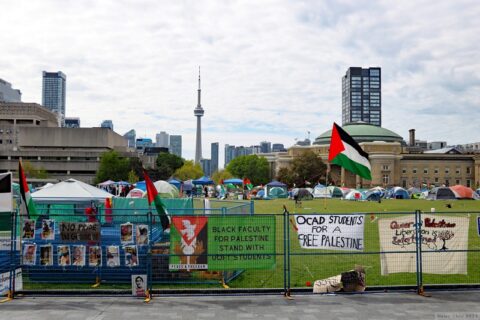TimeGhost History
Published 23 Mar 2025In 1947, the British divide the Raj into two nations, India and Pakistan, triggering one of the deadliest mass migrations in history. Sectarian violence between Hindus, Sikhs, and Muslims leaves at least 200,000 dead and displaces millions more. Hastily drawn borders turn neighbours into enemies. The partition’s bloody legacy will lead to decades of tension, war, and bloodshed.
(more…)
March 29, 2025
Why India and Pakistan Hate Each Other – W2W 015 – 1947 Q3
February 22, 2025
How the US Turned Iran Into a Dictatorship
Real Time History
Published 4 Oct 2024In 1953, Iran is at a crossroads. After decades of interference by foreign powers eager to exploit its oil reserves, the government decides it will throw them out and take control of the country’s wealth. But with the super powers’ Cold War paranoia and thirst for oil, it won’t be easy – especially once the CIA gets involved.
(more…)
January 26, 2025
German democracy under further threat from extremely extreme extreme right
German voters seem to be under the misapprehension that their votes should have something to do with the composition of the government. Because the voters increasingly cast their votes for the extreme right, government in Germany finds itself under incredible pressure to actually pay attention to the pestiferous voters:
This is a potentially huge story. It could be the beginning of a sea-change in German politics, that is how big it is. At the same time, it could be also be nothing. We’ll have to wait and see.
For those who don’t want to read my ramblings (this will be a longer post), I offer this TL;DR: The cordon sanitaire against Alternative für Deutschland is showing signs of serious rupture. The centre-right CDU are suddenly – without warning – reconsidering their long-standing tabu against cooperating with the “extreme right” opposition. It is this singular tabu that has kept the traditional German party system frozen in amber despite a massive rightward political shift across the West. Should the cordon sanitaire crack even a little, its days are numbered. The simple arithmetic of parliamentary majorities would sooner or later make the most noxious political fixtures of current-year Germany, like the Green Party, broadly irrelevant at the federal level. The German left would be deprived at once of almost all their power.
I am sceptical that this can really be happening. Yesterday, I would’ve expected a change like this in 2029 at the earliest. Many are saying (justifiably) that the CDU should not be trusted, that they will say anything to get elected and that nothing will come of their promises. All that may well be true. Words, however, matter all by themselves: In 2019, tacit cooperation in Thüringen between the CDU and the AfD unleashed an entire national scandal; the press hyperventilated for weeks. Now the federal leadership of the CDU is openly pledging to pass legislation with AfD votes in the Bundestag, and major CDU-adjacent journalists are writing long opinion pieces about why this is just the right thing to do.
This development arises directly from the pressure of mass migration, and specifically from the four recent deadly migrant attacks I have covered in the past year:
- On 31 May 2024, an Afghan migrant to Germany named Sulaiman Ataee killed the policeman Rouven Laur and severely wounded five others in a knife attack in Mannheim.
- On 23 August 2024, at a “Festival of Diversity” in Solingen, a Syrian migrant to Germany named Issa al Hasan killed three people and wounded eight in an apparently Islamist attack for which the Islamic State claimed responsibility.
- On 20 December 2024, a Saudi migrant to Germany named Taleb al-Abdulmohsen drove a rented BMW through the Christmas Market in Magdeburg, killing 6 people and wounding 299.
- On 22 January 2025, an Afghan migrant to Germany named Enamullah Omarzai killed two people and wounded three in a knife attack in Aschaffenburg.
Mannheim, Solingen, Magdeburg and now Aschaffenburg: That is the catalogue of migrant terror pounding like remorseless waves on the brittle outdated politics of the Federal Republic.
These attacks have become a symbol for the entire mess migrationism has wrought. The dead and the wounded count for a lot in themselves, but they have also come to represent the dwindling social cohesion, the stretched financial resources and the erosion of domestic security that accepting entire foreign populations into one’s nation entails. All of it is for nothing, nobody has any solutions and there is no end in sight.
In liberal democracies, policies have to be normie-friendly, and mass migrationism was normie-friendly only until enough migrants crossed our borders to make their presence felt socially and culturally. Mass migration isn’t normie-friendly anymore. It’s become a foul political poison.
Mass migration is also a very hard nut to crack. We have outsourced a great part of our border security and migration policy to highly bureaucratised international authorities and a tangle of high-minded humanitarian legislation that leaves us little room to manouevre. Solving mass migration will require a great deal of political resolve and a willingness to pick fights with globaloid EU pencil-pushers. All of this meant that, until Mannheim, Alternative für Deutschland had a near-monopoly on hardline anti-migration politics. The unrelenting series of attacks by people who have no business being in Germany, together with the collapse of the government and the impending early elections in February, have left the centre-right CDU desperate to stake their own claim to this increasingly central political space. That, and perhaps a healthy dash of the Trump Effect, are the forces currently pushing the traditional party system of the Federal Republic to the brink.
January 25, 2025
The stabbings will continue until morale improves
Sebastian Wang discusses the stabbing attacks in Southport, Merseyside last year:
On the 29th July 2024, a man went on a stabbing spree in Southport, Merseyside, killing three children and injuring ten others. The attacker, Axel Muganwa Rudakubana, the son of Rwandan immigrants, was arrested at the scene. By all accounts, the attack was shocking not only in its savagery, but in its attendant circumstances. Witnesses report that Mr Rudakubana shouted slogans as he killed that suggested he was an Islamic terrorist. Almost at once, social media was filled with questions and with speculation. Also, protests began in several northern cities – Manchester, Leeds, and Bradford, for example – where demonstrators blamed the Government and the ruling class for immigration policies that had made the killings both possible and likely.
Instead of considering these protests and promising to address the causes of the crime, the British Government and the legacy media focussed on managing the narrative and silencing comment on the immigration policies that had allowed Mr Rudakubana’s family into the country. Keir Starmer, the new Prime Minister, seemed more worried about potential “violence against Muslims” than the actual brutality of Mr Rudakubana’s attack on English people. “For the Muslim community I will take every step possible to keep you safe,” he said in his first public statement on the killings. On the protests he added: “It is not protesting, it is not legitimate, it is crime. We will put a stop to it“. His focus was not on the victims, but on ensuring that no one questioned the system that had allowed this to happen.
In the days after the attack, several men were arrested for spreading what the government called “misinformation” online. Their crime? Posting details about Mr Rudakubana’s background and motivations — details that turned out to be broadly correct. Despite being right, these men were prosecuted and imprisoned under Britain’s hate speech laws. The most recently convicted, Andrew McIntyre, was sentenced earlier this month to seven and a half years in prison for postings on social media. Peter Lynch, a man of 61, was sent to prison last August for two years and eight months for the crime of shouting “scum” and “child killers” at the police. Last October, he hanged himself in prison. I am told he was seriously “mistreated” in prison. British prisons for many years have been overcrowded. Room was found for these prisoners of conscience after the Government began releasing violent criminals.
The injustice of this is glaring. These men were punished not because they lied, but because they spoke approximate truths the government wanted to suppress. Their imprisonment sends a clear message: in modern Britain, it’s better to be wrong on the side of the Government than right and against it.
A Carefully Managed Narrative
The media played its part in the cover up. At first, Mr Rudakubana was described, without name, as “originally from Cardiff“. It took days before we were told he was a child of asylum seekers from Rwanda. Even then, the coverage was carefully balanced by a picture of him as a respectable schoolboy – not at the beast in human form shown by more recent photographs.
Only much later, when the story had faded from the headlines, did the real facts emerge. Mr Rudakubana was not just a troubled individual. His phone contained materials linked to terrorism and genocide, and his actions appeared to have an ideological motivation. Yet by the time these details came out, they barely caused a ripple. The public had been moved on to the next distraction.
It’s hard not to assume that the British media was fully in on gaslighting the public about the accused murderer, when you compare the photo that almost universally was used in the time before the trial and a more recent image:
Say what you like about Axel Rudakubana, the slaughterer of three English girls under ten years old, but — unlike the British Prime Minister, the Home Secretary, the Liverpool Police and most of the court eunuchs in the UK media — he appears to be an honest man:
It’s a good thing those children are dead … I am so glad … I am so happy.
He has always been entirely upfront about such things, telephoning Britain’s so-called “Childline” and asking them:
What should I do if I want to kill somebody?
Judging from his many interactions with “the authorities” (including with the laughably misnamed “Prevent” programme), the British state’s response boiled down to: Go right ahead!
It seems likely that the perpetrator of Wednesday’s Diversity Stabbing of the Day — the Afghan “asylum seeker” who killed a two-year-old boy and seriously wounded other infants in the Bavarian town of Aschaffenburg — is also “so happy”. Like Mr Rudakubana, the “asylum seeker” deliberately targeted a gathering of the very young — in this case, a kindergarten group playing in a municipal park. Like Mr Rudakubana, the “asylum seeker” did not just deliver sufficient stab wounds to kill: he plunged his knife into each target dozens and dozens of times. Like Mr Rudakubana, the “asylum seeker” was well known to the authorities: he had been detained for “violence” at least thrice.
Did these guys also enjoy it? From our pal Leilani Dowding:
For the benefit of American readers, being stabbed in Asda, Argus and Sainsbury’s is like being stabbed in Kroger, Costco and Wegman’s. As you may recall, a DC jury awarded climate mullah Michael E Mann a million bucks because someone unknown gave him a mean look in Wegman’s supermarket. No one stabbed in a UK supermarket will get a seven-figure sum: it’s increasingly a routine feature of daily life — per Sir Sadiq Khan, part of what it means to live in a great world city.
Sir Keir Stürmer and every outpost of the corrupt British state have lied to the public about every aspect of the Southport mass murder since the very first statements by the Liverpool chief constable passing off the killer as a “Cardiff man”. Her officers knew within hours that the Welsh boyo who loved male-voice choirs was, back in the real world, an observant Muslim in possession of the Al-Qaeda handbook and enough ricin to kill twelve thousand of his fellow Welshmen. But they did not disclose this information for months — not until freeborn Britons minded to disagree with Keir Stürmer’s Official Lies by suggesting that this seemed pretty obviously merely the umpteenth case of Islamostabbing had been rounded up, fast-tracked through Keir’s kangaroo courts, gaoled for longer than Muslim child rapists, and in at least one case driven to his death. Does Sir Keir feel bad about the late Peter Lynch? Or does he take the same relaxed attitude to his victims as Axel Rudakubana?
It’s a good thing that that far-right extremist is dead … I am so glad … I am so happy.
Even now, six months on, the organs of the state are still lying — although, with all the previous lies being no longer operative, Stürmer & Co have had the wit to introduce a few new ones. For example:
‘A total disgrace’ that Southport killer could buy a knife on Amazon aged 17, says Cooper
That would be Yvette Cooper, the Home Secretary — which is the equivalent of what Continental governments usually call the Minister of the Interior, because that’s where the knives penetrate.
January 14, 2025
Andrew Sullivan on the “grooming gangs” scandal in Britain
These rape gangs have been operating for more than a decade in English towns and cities yet the government does everything it possibly can to avoid taking action, for fear of being accused of racism (or perhaps fear of what they’d discover if they did properly investigate) and losing all those Muslim votes:
The first response of most human beings to news of irredeemably evil acts is to ask who committed them. And if the answer makes us deeply uncomfortable, we tend to move on pronto. You see this most obviously on social media with news of an atrocity. Was the shooter white, a Democrat, a Republican, Muslim, MAGA, woke, trans? And where did the victim fit into these categories?
Our priors instantly color our moral judgment, and even our sense of the seriousness of the offense. And the temptation simply to deny what seems to be in front of our nose can be overwhelming.
[…]
The more intense the horror, the more powerful the instinct to doubt when you first hear of it. The sex-abuse scandal in my own church first numbed and incapacitated me. It took some time for me to see the totality of what had happened, and how deeply it had destroyed Catholic moral authority. Again, when I first read about, say, the Catholic school for deaf children where a priest had picked his victims among those whose parents did not know sign language, the feeling of horror was almost too much to process at all. And as with the Bush administration’s torture policy, it took even more time to grasp how this moral rot had been enabled by the very top.
This is why, I think, the scandal of Britain’s Pakistani rape-gangs, and the institutional negligence toward tens of thousands of underage victims over several years, has had a second burst of life. A serious national inquiry on the scandal was conducted years ago (its recommendations not yet implemented). But several towns with the worst records were omitted from that inquiry; and the sheer scale and depravity of what happened has finally begun to sink in. The precipitant was Elon Musk pontificating about the scandal on X, as part of his campaign to bring down Keir Starmer.
The details are hard to absorb. Think of the hideous abuse suffered by that extraordinary French woman, Gisèle Pelicot, sedated and raped by dozens of French men, organized by her husband. Now think of that kind of organized gang-bang — but make it close to ubiquitous in some towns and the victims under-age girls: raped, brutalized, mutilated, beaten, their lives destroyed. Yes, it was that bad. Tens of thousands of rape victims across the country. This is how one British judge addressed some culprits at sentencing:
You coerced her into providing sex to vast numbers of strangers. Up to four or five men would be invited to addresses so they could have sex with her … Threats were made to kill her … If she resisted, she would be coerced. Customers would become angry … If oral sex was required, her head would be pushed down, her hair pulled and she would be slapped. Strangers would burn her with cigarettes. A stranger almost throttled her. One deliberately scratched her vagina with his nails. One inserted a hairbrush into her vagina.
The victim was just 13 years old. And she wasn’t unconscious. In just one town, a “conservative estimate is that approximately 1,400 children were sexually exploited” between 1997 and 2013. And in communities dominated by men of Pakistani origin, largely from the Mirpuri region of Kashmir, who held huge sway over the police and local community — just like the Catholic Church in Boston — cover-ups were routine.
Among the abuse concealed: gang-rapes of a single minor by 20 men; putting a pump into a girl’s anus so more men could penetrate her at once; and constant threats of murder of the girls or their families if anyone spoke up. In one case, a minor was arrested and charged with prostitution for having oral sex in a car with a john. When she attended her trial, she discovered that the magistrate in charge of her case was the man she’d fellated. No one knows the full number of minor girls affected, but it is in at least the tens of thousands, and possibly in the six figures.
Why was this allowed to go on for so long? For the same reason the Catholic Church covered up child rape for decades, and Dick Cheney covered up torture. Because the orthodoxies of Catholicism, of the American military, and, in this case, the multicultural experiment were respectively involved. These orthodoxies were sacred, their cultural power extreme. Catholic Boston, conservative America, and elite liberal Britain therefore defended their own orthodoxies for a very long time. And with every successful deflection of responsibility, the number of victims increased.
The truth damns the multicultural project in Britain. Rather than integrating these men of Pakistani heritage, insisting that they adopt the laws and mores of the native population, and treating them like everyone else, the UK elites celebrated cultural difference, enabled the siloing of these populations, bemoaned their own white working-class populations, and forbade any criticism of Islam. So if you called out this stuff, you were instantly called racist. After all, to accuse a non-white minority of raping white girls was a trope right out of white-supremacist fever dreams. And yes, it is a hideous racist trope — from the depths of the American South. But sometimes the trope is the truth.
In all the major cases, I’ve found no reported evidence of Pakistani or Muslim girls being groomed and raped — only poor, white natives. The justification among the rapists, moreover, was that these non-Muslims were sluts who were asking for it and beneath contempt. Racist insults were common as these girls were brutally abused. These were not just rapes, but hate crimes of a grisly sort.
January 6, 2025
The rape gangs in Britain were enabled and protected by “good people” who didn’t want to be accused of racism
Tom at The Last Ditch confesses his early complicity with the official culture of silence that protected and encouraged the exploitation of girls and young women in Britain for decades:
Everyone who ever participated in the leftist orthodoxy of identity-politics is to blame for the near-total impunity of the Muslim rape gangs in Britain. As I reported here, when I was a young solicitor in Nottingham, a police sergeant told me I was “part of the problem.” I had a choice between believing what he told me about “honour killings” in that city or preserving my good standing as an anti-racist liberal. I chose the latter. I feared my career prospects and social standing would be jeopardised (they would have been) if I accepted his honest account. I called a good man a racist (mentally equating him with the likes of Nick Griffin and recoiling in fear from the association) when he was just horrified (as any decent human should be) by young women being murdered.
In that moment, I very much was “part of the problem” and I am profoundly ashamed of that. It is fortunate that – unlike the politicians, local councillors, social-workers and police officers who should have brought the rape gangs or the “honour” killers to justice (or prevented both phenomena altogether) – I had no occasion ever to make any real life choices on the matter. I believe – faced with actual evidence – I would have made better ones, but the way I failed the good sergeant’s test that long-ago day in the early 1980s proves I would have wanted to look the other way, just as they actually did.
I am not still playing the stupid rainbows and unicorns game of cultural moral equivalence (still less the foul Critical Race Theory game of cultural moral hierarchy) when I make the point that the young white working class girls in our cities have not been the only victims of multiculturalism. Those murdered Muslim girls who (so the sergeant told me) had paraffin poured over them and were burned to death were victims too. It was racist to refuse to consider that their Muslim dads, uncles and brothers might murder them because of their primitive religious and cultural notions. It was racist for our authorities to treat Muslim men who gang-raped white girls differently than they would have treated others. It was racist to cover up these horrors in order to protect the myth – shamefully repeated just days ago in his annual Christmas message by His Majesty the King – that multiculturalism has been an overall benefit to Britain.
Some of us have been making these points as best we can for a long time. Many of us had given up, if we’re honest. It was clear that the official narrative that we were racists and that these stories were disinformation – a “moral panic” as Wikipedia puts it – was going to prevail. Until recently the key social media market of ideas – Twitter – was controlled by the Left and attempts to raise the issue were likely to be memory-holed by their private sector woke equivalent of Orwell’s MiniTru.
Miraculously, Elon Musk – a modern Edison, with plenty to occupy him besides our concerns about free speech – bought Twitter and (in one of history’s greatest acts of philanthropy) set it free at his own personal expense. He told advertisers who sought to maintain its old Newspeak regime to “go fuck themselves.” Miraculously he got involved in the issue not just in America (where the Constitution gives him some basis for hope) but in Britain too.
My British Constitution textbook at law school illustrated the supremacy of our Parliament by jokingly saying that it could – in law – make a man into a woman. Little did its authors know that dimwit politicians would later prove the educational point of their joke by making it real. Our constitution – as a result of centuries of struggle with the monarchy, which Parliament decisively won – can be summarised in just three words – “Parliament is supreme”
December 23, 2024
Mark Steyn – “…the German state’s message to voters is: It’s all your fault and nothing’s gonna change”
At SteynOnline, Mark discusses the media reactions to the terror attack on the Christmas market in Magdeburg:
Say what you like about Germany but their crack police investigators are second to none:
Prosecutor Horst Walter Nopens said on Saturday that the investigation was ongoing but suggested one potential motive for the attack “could have been disgruntlement with the way Saudi Arabian refugees are treated in Germany“.
Gotcha. So, two months before the federal election, the German state’s message to voters is: It’s all your fault and nothing’s gonna change. Nothing against the nine-year-old boy who’s dead or the four ladies – aged 75, 67, 52 and 45 – but that’s just the way it is. There will be a few empty chairs at the Christmas table, but diversity is our strength and a well-integrated psychiatrist driving a BMW is just the kind of high-skilled newcomer Mutti Merkel promised us. He could have gone to Canada or Ireland. To modify George W Bush, we need immigrants to do the jobs that Germans won’t do … like, er, psychiatry.
Are they putting this kind of bollocks in the Covid boosters? Not so long ago the most famous terrorist killer on the planet was a high-value German immigrant. At least a few readers I’ve had occasional email exchanges with over the decades may recall him flying through the window of their office building on a Tuesday morning in September: Mohammed Atta, the man who pulled off what they used to call “the day the world changed” … and a postgraduate student of the Hamburg Institute of Technology.
If you’ve been enjoying the expert class’s bewilderment at the citizenship and professional status of the perp, well, way back when, the grandparents of the current crop of media experts were all over the airwaves explaining why the real threat came from well-travelled middle-class westernised Muslims and that Mr Atta had become “radicalised” when he moved to Hamburg.
It certainly was “the day the world changed” — if by “changed” you mean accelerated Islamic migration to the west: Twenty years ago there were half-a-million Muslims in Canada; now there are two million. As to the “disgruntlement” of Saudis at the way they’re treated in the west, seventeen of Mohammed Atta’s accomplices were Saudi nationals who’d been admitted to flight school in America, where they told their instructors that they didn’t need to do the bit about learning how to land. Which raised not an eyebrow. To channel P G Wodehouse, few people have so much cause to be gruntled.
By the way, how did Mr Atta wind up at the Hamburg University of Technology? Because a nice tourist couple from Germany were visiting Cairo and, at a restaurant one night, struck up a conversation with Mohammed’s dad and said they ran an exchange programme for foreign students back in der Vaterland and would Mo like to come and live with them. Aw, that’s heart-warming. And, despite the three thousand deaths directly arising from that virtue-signalling, I’m sure they’d do it all over again.
In other words, this is where we came in: all the elements the cable experts profess to find “puzzling” we knew back on Day One of the soi-disant “War on Terror”. Even the allegedly newest wrinkle is not new:
December 21, 2024
QotD: Portugal’s early expansion in the Indian Ocean
At a cursory glance, the first arrival of Portuguese ships in India must not have appeared to be a particularly fateful development. Vasco da Gama’s 1497 expedition to India, which circumnavigated Africa and arrived on the Malabar Coast near Calicut consisted of a mere four ships and 170 men — hardly the sort of force that could obviously threaten to upset the balance of power among the vast and populous states rimming the Indian ocean. The rapid proliferation of Portuguese power in India must have therefore been all the more shocking for the region’s denizens.
The collision of the Iberian and Indian worlds, which possessed diplomatic and religious norms that were mutually unintelligible, was therefore bound to devolve quickly into frustration and eventually violence. The Portuguese, who harbored hopes that India might be home to Christian populations with whom they could link up, were greatly disappointed to discover only Muslims and Hindu “idolaters”. The broader problem, however, was that the market in the Malabar coast was already heavily saturated with Arab merchants who plied the trade routes from India to Egypt — indeed, these were precisely the middle men whom the Portuguese were hoping to outflank.
The particular flashpoint which led to conflict, therefore, were the mutual efforts of the Portuguese and the Arabs to exclude each other from the market, and the devolution to violence was rapid. A second Portuguese expedition, which arrived in 1500 with 13 ships, got the action started by seizing and looting an Arab cargo ship off Calicut; Arab merchants in the city responded by whipping up a mob which massacred some 70 Portuguese in the onshore trading post in full sight of the fleet. The Portuguese, incensed and out for revenge, retaliated in turn by bombarding Calicut from the sea; their powerful cannon killed hundreds and left much of the town (which was not fortified) in ruins. They then seized the cargo of some 10 Arab vessels along the coast and hauled out for home.
The 1500 expedition unveiled an emerging pattern and basis for Portugal’s emerging India project. The voyage was marked by significant frustration: in addition to the massacre of the shore party in Calicut, there were significant losses to shipwreck and scurvy, and the expedition had failed to achieve its goal of establishing a trading post and stable relations in Calicut. Even so, the returns — mainly spices looted from Arab merchant vessels — were more than sufficient to justify the expense of more ships, more men, and more voyages. On the shore, the Portuguese felt the acute vulnerability of their tiny numbers, having been overwhelmed and massacred by a mob of civilians, but the power of their cannon fire and the superiority of their seamanship gave them a powerful kinetic tool.
Big Serge, “The Rise of Shot and Sail”, Big Serge Thought, 2024-09-13.
October 20, 2024
Debunking the “Muslims saved the Graeco-Roman legacy” intellectual urban legend
In my weekly set of recommendations from Substack there was a link to A History of Mankind‘s debunking of what is described as an “intellectual urban legend”:

Islamic scholars at an Abbasid library in Baghdad.
Illustration by Yahyá al-Wasiti from 1237 via Wikimedia Commons.
Among the most popular of those legends, there’s one that can be summarized as “Arab scholars and translators saved the books of Graeco-Roman antiquity from being destroyed by the Christians and/or forgotten”. This a surprisingly widespread view. I’ve lived in several countries, and heard versions of this legend, often told in very simple terms over somewhat complicated drinks, from well-educated people often working in academia or the financial sector (which makes more sense than it appears — I’ve worked in the financial sector myself, and people there are highly educated as a rule).
I’ve even heard scholars (normally not Medievalists) express this view, and I’ve read views to this effect in multiple occasions. Just Google “did the arabs save graeco-roman books” and look at the top results, if you don’t believe me. Lots of well-educated people believe this, not to speak of history enthusiasts all over the Internet.
However, the truth is that Arab translators had only a modest impact on the transmission of Graeco-Roman texts to modern times. There are various reasons that explain this, but first let me provide some clarity on why Baghdad’s Medieval “House of Wisdom” — oft-cited, correctly, as the center of the Abbasid-era translation movement inasmuch as there was one — is one of history’s most misunderstood institutions.
The House of Wisdom functioned as a state library with a focus on the transcription and storage of manuscripts, and their translation to the court’s main language, Arabic. Based on a similar library patronized by the Sasanian emperors and staffed with some of its personnel from about the 8th century, the House of Wisdom employed Christian Greek speakers – very few Muslims spoke or read Greek fluently in this era and others, particularly Arabs – as well as Muslim and Zoroastrian Arabic or Syriac speakers who worked to translate and disseminate work.
[…]
Just to give a final touch of class to these absurd claims, Abu Sahl added the detail that the Greeks, dunces as they all are, forgot to actually steal many Iranian books, and simply memorized the contents before they torched them, so the actual Greek copies of Iranian greats are, by necessity, inferior versions diluted by the Greeks’ faulty memory.
Some Muslim scholars later came up with a new wrinkle that Byzantines were poor keepers of their own treasures, and their books were eaten by insects, as the bibliographer Al-Nadim (932-995) wrote in a second- or third-hand anecdote about some guy who visited Constantinople and was sad to see some ancient temple filled with neglected books, later widely quoted, and included in his Index of 987. The same Al-Nadim transmits from someone “trustworthy” that the Byzantines burned fifteen loads of books by Archimedes, which never happened.
Abdullah Ibn-abi-Zayd (922–998), a prolific North African writer on Islamic law, came up with a wrinkle for this wrinkle: that the Byzantine emperor gathered books and hid them in a secret building to prevent heresy among potential readers; and when Yahya, a prominent Bamarkid Persian in the Abbasid court, heard of the repository he asked if he could borrow the texts. The emperor agreed on the condition that they were never returned, so that they would never hurt the delicate Christian feelings of his subjects.
Others with less experience of the Christian West, like the Egyptian Arab Ibn Ridwan (988-1061), claimed that ancient sciences were forgotten there, and only survived in the Ummah because of the supreme wisdom and care displayed by Al-Mamun and their successors. Ridwan’s fable showing just how obscurantist and dumb Christians are proved particularly successful, being often retold with the kind of reverence typically reserved for hadiths:
The history of medicine begins with a brief account of the development in antiquity from Asclepius to Galen. After Galen, the community of the Christians emerged from and prevailed over the Greeks. The Christians considered it a fault to study intellectual matters and their kings cast away the care for medicine and failed to take care of its students. So its students ceased to commit themselves to the toilsome study of medicine and found reading Hippocrates’ and Galen’s works too tedious; thus, it fell into disorder and its condition worsened. Then came Oribasius, after the Christian kings’ lack of interest in the instruction [of medicine] was firmly rooted … When none of the kings any longer felt the desire to promote the teaching [of medicine] and the people found Hippocrates’ and Galen’s works on it too tedious and tended to compendia and abridgments, the most prominent Alexandrian physicians, afraid that the art would vanish altogether, asked those kings to retain the teaching [of medicine] in Alexandria and [to allow] only twenty books on medicine to be read, sixteen from Galen’s and four from Hippocrates’ works … The teaching stood on shaky ground until al-Ma’mun ‘Abd-Allah ibn-Harun al-Rashid became caliph, who revived and spread it and favored excellent physicians. But for him, medicine and other disciplines of the ancients would have been effaced and obliterated just as medicine is obliterated now from the lands of the Greeks, which had been most distinguished in this field.
I should also mention that it wasn’t just the Graeco-Romans who the Abbasid-era Muslims ripped off in bulk. The fact that Indian numerals came to be known in Europe as “Arabic” numerals, and chess was widely, and wrongly, believed to be an Arabic invention, gives an idea about the impact that Caliphate scholars had as synthesizers and popularizers of scientific knowledge.
Indeed, when the Iranian Al-Khwarizmi (780-850), head of the House of Wisdom from around 820, published the earliest Arabic text on Indian numerals, he chose a title of disarming honesty: “Addition and subtraction according to the Indian calculation”. Such honesty was rarely imitated by Al-Khwarizmi’s successors.
I think you are probably getting the gist of how the story about the Muslim salvage of Graeco-Roman antiquity came about, and was later embraced by every Atheist writer in the West, so that he or she could have nice laughs at the expense of those barbarian fools who never washed themselves, the Christians.
September 28, 2024
The rise in niqab and hijab use among Muslim women in Britain
In The Conservative Woman, Gillian Dymond discusses the cultural significance of Muslim women’s distinctive styles of clothing in modern Britain:
AS I WENT to the shops the other day in Whitley Bay, a strangely incongruous figure passed me. It was a woman in a niqab. In a recent article on his Substack, Joshua Trevino wrote an elegy for London: “I had not seen this many women in hijabs since a brief stint working in Jordan decades ago, and I had never seen this many women in a niqab, ever.” Up here on the north-east coast of England, it is different. True, even in Newcastle hijabs proliferate, but I had never before encountered the full niqab there, let alone in the small seaside town where I live.
The Government, I understand, are considering bringing in a law which would criminalise Islamophobia, as defined by the All-Party Parliamentary Group on British Muslims. “Islamophobia,” this states, “is rooted in racism and is a type of racism that targets expressions of Muslimness or perceived Muslimness“.
This, as Andrew Doyle points out here, is nonsense, incorrectly conflating a belief-system with racial identity. Let’s be accurate: Muslims can be of any race, English included. Moreover, different Muslims exhibit different kinds and degrees of “Muslimness”, from the Sufi, mystically seeking the divine, through the undogmatic, many of whom happily dispense with headscarf and hijab and the more bellicose interpretations of the holy books, to the kind of male fanatic who, on seeing a female co-religionist wearing Western dress and sporting lipstick, seizes her by the hair and slams her head on the dashboard of the car she has been shamelessly driving.
There is a variety of “Muslimness”, in short, whose intolerance cannot be tolerated in a tolerant society, and whose existence requires not protective legislation, but public acknowledgement of its incompatibility with the British way of life.
I do not know how the woman whose eyes peered through the slit in her black draperies felt about parading her glaring lack of integration on a street in north-east England. Did she go proudly and self-righteously into the alien throng, or had she been forced out of the house, heart pounding, to run the gauntlet of raised eyebrows in her eye-catching gear? What did she think of the women around her, hair and faces exposed, arms bare to soak up every last ray of autumnal sunshine, some of them, fresh from the beach, wearing shorts? Did she despise their “immodesty”? Did she envy them?
Who knows? There can be no casual breaching of the niqab’s anonymity, no spontaneous communication, when confronted by a garment which puts up barricades against the usual signals and responses of easy human intercourse.
On the other hand, the mentality of the men who insist on enveloping their wives and daughters head-to-foot in long black shrouds before they are allowed out in public is very clear indeed. These men have been taught to view women as assets to be protected, and they no doubt believe that the heavy-handed protection they impose is necessary, because they take it for granted that no man is able, or should be expected, to control his sexual urges in the face of female allurements. As for any woman who does not remain decently covered in deference to the male’s helpless susceptibility, she should know the consequences, and deserves everything coming to her.
August 9, 2024
Domicidal maniacs in charge
Lorenzo Warby provides an oh-so-useful word to accurately capture what the diversity-at-all-costs elites running most western countries these days are actually up to:
Domicide is the destruction of home. It comes in the “hard” version — the physical destruction of houses and infrastructure.
Domicide also comes in a “soft” version — flooding localities with new people, separating people from, and otherwise degrading, their heritage. When folk say Britain is becoming “unrecognisable”, it is the domicidal effect of mass migration they are referring to.
The UK is suffering from a domicidal elite, one that uses mass migration to break up working-class communities; asymmetric multiculturalism to elevate incoming cultures over those of native English (the Celtic fringe get minority brownie points); favours non-“white” faces in advertising; asymmetric race-swapping in entertainment against the native English; denigration of British history as racist, white supremacist, imperialist, colonialist, etc.
Much of this is insulting virtue-signalling allied to, or presenting, cartoonish (simplified) and caricature (distorted) history. It all undermines social cohesion. But it is the use of migration policy as a systematic weapon against the resident working class which does the most damage. Though two-tier policing — obviously treating Muslims in particular with a deference not shown to the natives, especially when it comes to policing speech — is also highly corrosive of social cohesion.
Many working-class communities in Britain were already fairly dysfunctional — though the British state is not innocent in those dysfunctions1 — and sections of the British working class are very far from admirable. None of this justifies the use of mass migration to make things worse for such folk, however much it may help to explain the moralised class contempt that underlies so much of modern progressivism and modern managerialism.
To improve such things, to “level up”, requires a strong sense of how to create and maintain social order. Modern progressivism is strongly antipathetic to such understanding. To “level up” also requires a strong sense of custodianship, which managerialism typically lacks: particularly progressivist managerialism.
Indeed, modern feminist, progressivist, managerialism—in its lack of custodianship; lack of social solidarity;2 in its antipathy to taking the problems of social order seriously — is running the British state into the ground. The post-medieval British aristocratic and mercantile elite did a much better job of state management. But those elites had mechanisms — such as duelling, that forced men to defend their reputation at the risk of their life, and grand country houses, that turned into expensive investments in social isolation if you behaved badly — that selected for character.
Nowadays, the British elite only selects for capacity and even that is being degraded by DEI undermining the signals of competence. It turns out, over the longer term, character matters more than capacity. For capacity without character selects for manipulative, anti-social personalities that degrade institutions over time.
1. For a particularly brutal depiction in fiction of the dysfunctional British welfare state — especially its school system — see Christopher Nuttall’s Mystic Albion series, especially the first book.
2. Feminisation of institutions and discourse has tended to degrade social solidarity, see Benenson et al, 2009. The most conspicuous example of this in the UK is how uncouth it is in elite circles to mention the systematic rape and sexual exploitation of underage working class girls by overwhelmingly Muslim gangs.
August 7, 2024
August 6, 2024
Britain’s immigration debate turns violent
At The Last Ditch, Tom discusses how the immigration issue has become the issue in modern Britain:
Margaret Thatcher famously quoted Kipling’s Norman and Saxon to President Mitterand of France in an EU meeting;
The Saxon is not like us Normans. His manners are not so polite.
But he never means anything serious till he talks about justice and right.
When he stands like an ox in the furrow – with his sullen set eyes on your own,
And grumbles, “This isn’t fair dealing”, my son, leave the Saxon alone.She was trying, perhaps not as delicately as her diplomats would have wished, to explain how the apparently calm British will react – eventually – to being wronged.
I spent twenty years in three other countries and worked closely in business with people from many more. I have often smiled to myself since returning when I hear British people speak of our unique sense of fair play. It’s not unique at all. Everyone has it. We do not own fairness. We do not own tolerance.
We do, however, traditionally pride ourselves on both and the way we see ourselves has shaped our reactions over the last twenty-five years as we welcomed more immigrants than in the previous two millennia. A few years ago I listened quietly to a Bangladeshi friend – a would-be human rights lawyer – talk about racism in our country. I asked her where in the world was a better place to live as a member of an ethnic minority. On reflection, she agreed with me that there is nowhere.
I am not saying we couldn’t treat each other better. Of course we could and should try. But let’s take a moment, as our streets burn and our elites condemn us as far-right racists, to be proud of how we’ve behaved in general towards so many new arrivals in such a short time.
[…]
One day history may reveal which politician in the capital of an old European empire realised there was a ready supply of workers in the former colonies. People who spoke our languages and were familiar with our systems of government – because both had been forced on their ancestors. It was a perilous idea that may yet prove to be the end of European civilisation but he must have looked like a genius to his peers.
The doors were opened and cheap labour flooded in. From the lofty heights where the elites survey us, it looked like a perfect solution. On the ground, not always so much. Mostly we’ve been welcoming, accepting and tolerant. We’ve sometimes even gone beyond tolerance and flattered our new arrivals that they’ve enhanced our magnificent old culture with their jerk chicken and curries.
Yet already when I was a youngster practising criminal law problems had begun to emerge. A custody sergeant with whom I used to chat when waiting to see clients in the cells told me suicide rates among Muslim girls in our Midlands city were disturbingly high. Asked why that was, he said they were not suicides, but honour killings – the first time I’d heard that phrase. No-one, he said, commits suicide by pouring paraffin over themselves and setting themselves alight. It’s just too painful. Muslim men were killing their daughters and sisters. Asked why there were no prosecutions, he said senior police officers made it clear to their subordinates that it was “racist” to suggest the dead girls’ families’ stories of suicide were untrue.
Fresh out of my university law faculty, I sneered that his bosses were right and he was a racist. I will never forget the last words he said to me;
Young man, then you’re part of the problem.
And I was. In that moment, I’d turned away from murdered women to preserve my smug world view. Just as, decades later, council staff and police officers in cities all over Britain turned away from young girls groomed and raped by Muslim men, for fear of being called bad names.
Gary Fouse in the New English Review asks whatever happened to Merry Olde England:
If you have been following the news out of England for the past week, you might think that the country has all but fallen into civil war. Riots and various forms of violent protests and counterprotests have broken out in cities all over the country in reaction to a shocking murder that occurred in the town of Southport last week. On July 29, a group of little schoolgirls were attending some sort of Taylor Swift-themed dancing class when a 17-year-old son of Rwandan immigrants (who was born in England) attacked them with a knife. Three of the schoolgirls (ages 6. 7, and 9) have died and eight others went to the hospital with serious knife wounds.
The entire nation has erupted in shock and anger. Obviously, the anger is being directed at immigrants in general — given the country’s out of control migration situation and long-simmering tensions with the largely-radicalized Muslim communities. It seems that now-finally — the people have had enough. At least one migrant shelter has been attacked, and several Muslim young men are showing up to counter-protest and do battle with young white men. Now the cops in several cities are trying to keep the two sides apart.
I should state at this point that I will not condone the violence and destruction that is taking place and the objects being thrown at police who are trying to keep order. While I do not condone the violence, I think I can understand why it is taking place. I recall back in the 1960s when there were many riots in inner city areas of the US during the Civil Rights era and in response to the murders of black civil rights leaders like Martin Luther King and Medgar Evers. Many responsible black leaders condemned the violence but also added that they could understand the reasons for it. It was a different era then in America, and in the South, segregation had the force of local laws behind it. Many blacks felt that the government was not responding to their grievances.
[…]
The fact is that far too many nations in the West, including ours, have suffered from bad political leadership. We see it in our cities, we see it in our state capitals, and we see it in Washington DC. Bad political leadership results in bad cities, bad states, and a bad country. The fish rots from the head, and what we need to do-in England-in France, in America, etc is elect responsible people who recognize that their government’s number one duty is to protect the citizens. When a government fails to do so, eventually what happens is what we see in England today.
August 3, 2024
The Battle of Lepanto, 7 October 1571
Big Serge looks at the decisive battle between the “Holy League” (Spain, Venice, Genoa, Savoy, Tuscany, the Papal States and the Order of St. John) against the Ottoman navy in the Ionian Sea in 1571:

“The Battle of Lepanto”
Oil painting by Juan Luna, 1887. From the Senate of Spain collection via Wikimedia Commons.
Lepanto is a very famous battle, and one which means different things to different people. To a devout Roman Catholic like Chesterton, Lepanto takes on the romanticized and chivalrous form of a crusade — a war by the Holy League against the marauding Turk. At the time it was fought, to be sure, this was the way many in the Christian faction thought of their fight. Chesterton, for his part, writes that “the Pope has cast his arms abroad for agony and loss, and called the kings of Christendom for swords about the Cross”.
For historians, Lepanto is something like a requiem for the Mediterranean. Placed firmly in the early-modern period, fought between the Catholic powers of the inland sea and the Ottomans, then on the crest of their imperial rise, Lepanto marked a climactic ending to the long period of human history where the Mediterranean was the pivot of the western world. The coasts of Italy, Greece, the Levant, and Egypt — which for millennia had been the aquatic stomping grounds of empire — were treated to one more great battle before the Mediterranean world was permanently eclipsed by the rise of the Atlantic powers like the French and English. For those particular devotees of military history, Lepanto is very famous indeed as the last major European battle in which galleys — warships powered primarily by rowers — played the pivotal role.
There is some truth in all of this. The warring navies at Lepanto fought a sort of battle that the Mediterranean had seen many times before — battle lines of rowed warships clashing at close quarters in close proximity to the coast. A Roman, Greek, or Persian admiral may not have understood the swivel guns, arquebusiers, or religious symbols of the fleets, but from a distance they would have found the long lines of vessels frothing the waters with their oars to be intimately familiar. This was the last time that such a grand scene would unfold on the blue waters of the inner sea; afterwards the waters would more and more belong to sailing ships with broadside cannon.
Lepanto was all of these things: a symbolic religious clash, a final reprise of archaic galley combat, and the denouement of the ancient Mediterranean world. Rarely, however, is it fully understood or appreciated in its most innate terms, which is to say as a military engagement which was well planned and well fought by both sides. When Lepanto is discussed for its military qualities, stripped of its religious and historiographic significance, it is often dismissed as a bloody, unimaginative, and primitive affair — a mindless slugfest (the stereotypical “land battle at sea”) using an archaic sort of ship which had been relegated to obsolescence by the rise of sail and cannon.
Here we wish to give Lepanto, and the men who fought it, their proper due. The continued use of galleys well into the 16th century did not reflect some sort of primitiveness among the Mediterranean powers, but was instead an intelligent and sensible response to the particular conditions of war on that sea. While galleys would, of course, be abandoned eventually in favor of sailing ships, at Lepanto they remained potent weapons systems which fit the needs of the combatants. Far from being a mindless orgy of violence, Lepanto was a battle characterized by intelligent battle plans in which both the Turkish and Christian command sought to maximize their own advantages, and it was a close run and well fought affair. Lepanto was indeed a swan song for a very old form of Mediterranean naval combat, but it was a well conceived and well fought one, and Turkish and Christian fleets alike did justice to this venerable and ancient form of battle.
July 12, 2024
They’ll confidently claim they’re merely “anti-Zionist“
James Pew on the disturbing rise of antisemitism in all western nations that got turbocharged by the October 7 atrocities by Hamas terrorists against Israeli civilians on the Gaza border:

“Student encampments – UofT – Camping at the university” by Can Pac Swire is licensed under CC BY-SA 2.0 .
Jew hatred in this country, and around the world, is something I completely miscalculated. Like so many others, including many Jewish people, I naively thought that antisemitism was a thing of the past. Or at least, it was something that had been greatly diminished to the extent that it ceased to be much of a problem. Tragically, I was wrong about this.
The global expansion of Islamo-fascism and the mixing of pro-Jihadism with leftist critical social justice activism, is something I also, similarly, underestimated.
When I think of October 7th I am overcome with disgust and sadness. The world should be aligned with Israel, and aggressively opposed to Palestine/Hamas (Hamastinians) and the corrupt United Nations Relief and Workers Agency (UNRWA). That in many cases it appears to be the other way around, that many political leaders, media, and insufferable celebrities support Hamas’ terrorist aspirations, their evil nonsensical movement to wipe Israel off the face of the planet, is something that is incomprehensible to me.
In one of the late Rex Murphy’s final National Post columns, he proclaimed that “Hatred of Israel is the great moral disorder of our time”. Placing the blame for the “red-ignorant core” of the post-October 7th rise in antisemitism on “woke campuses”, Rex wrote the following concerning the legitimacy of the state of Israel:
Dear Israel is but a spit of earth on a huge globe. Three years after six million Jews were put to torture, humiliation, whippings, rape, medical experiment, starvation, and vile death, was it not surely time — time for all the nations of the Earth who had reached some moral understanding of life and government — to allow Jewish people time to rest, time to mourn, time to see what and who might be left of them.
While I’m the first to admit that no nation, including Israel, is beyond criticism, I feel there is both a time and place, and an appropriate proportionality that should be reflected in a fair critical analysis of any nation. When Douglas Murray made the point at the recent Munk debate that no serious person ever questions the legitimacy of the nation of Pakistan — a nation founded in a way similar to Israel — like they question and challenge the legitimacy of Israel, so-called anti-Zionists claimed that the audiences’ embrace of Murray’s logic was simply evidence of their Islamophobia.
Murray expanded on his Pakistan/Israel comparison by asking the audience to imagine someone who feels that Pakistan is not legitimate and therefore should not exist at all. Imagine also, that this person holds no antipathy directed at the Pakistani people. Preposterous! Yet the anti-Zionists ask us to believe this in regards to Israel. The anti-Zionist will look you straight in the eyes, and with all the sincerity in the world, express their belief that Israel should not exist, and absurdly, implore this does not mean they hate Jews (the majority of Israelis). Why in the case of an analogy where Pakistan is at stake, is it so clear which position is the correct and moral one? Alternatively, why are such questions involving Israel so difficult to answer?
In Canada, the increase in antisemitism has been going on for years. Record levels of antisemitism were recorded in 2021, with dramatic increases in Quebec and British Columbia.1 B’nai Brith Canada reported the number of antisemitic incidents across the nation more than doubled from 2022 to 2023, now reaching an unprecedented high.2
In February of 2024, Global Media reported that “Homes, businesses, schools, places of worship, neighbourhoods and institutions have all been targeted in what community leaders are calling an unparalleled spike in hate crimes against Jews”. And the Toronto Police warned the following month that “56% of reported hate crimes in 2024 have targeted Jewish people”.3
None of this distracts Canadian Islamists, like Younus Kathrada, from what they feel are the important social issues. Kathrada has been known to the government’s Integrated Terrorism Assessment Centre since at least 2020.4 He preaches to his Islamic followers in British Columbia, “I want our children to understand this well: the non-Muslims are the enemies of Allah, therefore they are your enemies”.5
















